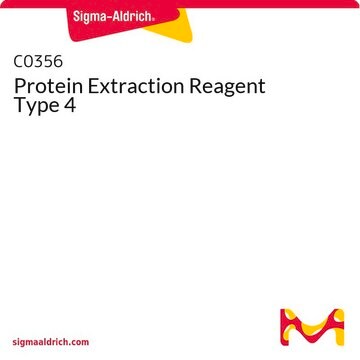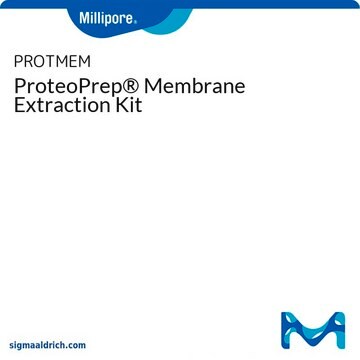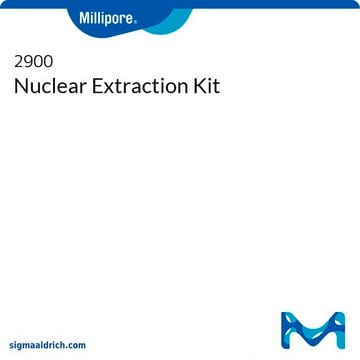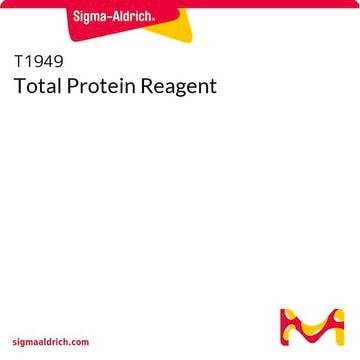PE0230
Plant Total Protein Extraction Kit
Suitable for any plant species or tissue
Sinónimos:
Total Protein Extraction Kit
Iniciar sesiónpara Ver la Fijación de precios por contrato y de la organización
About This Item
UNSPSC Code:
41105500
NACRES:
NA.56
Productos recomendados
General description
The Plant Total Protein Extraction Kit is designed specifically for use in plant bioscience to extract a qualitative sample of all proteins from any type of plant species or tissue. The protocol does not require any ultracentrifugation or aqueous polymer two-phase partitioning (APTP). The kit includes two reagents; a plant specific protease inhibitor cocktail and a new chaotropic reagent with increased solubilizing power to extract more hydrophobic proteins (C0356, Protein Extraction Reagent Type 4). Routine use of the reagent in sequential protein extraction of a plant tissue sample with fresh reagent removes nearly all protein from the tissue. The protease inhibitor cocktail is a mixture of protease inhibitors with broad specificity for the inhibition of serine, cysteine, metalloproteases, aspartic, and aminopeptidases. It contains pepstatin A, 4-(2-aminoethyl)benzenesulfonyl fluoride (AEBSF), E-64, leupeptin, 1,10-phenanthroline, and bestatin. The cocktail has been demonstrated to be highly effective in preventing protein degradation during the extraction process.
Following removal of polyphenolics, tannins, and other interfering substances, ground plant tissue, fresh or frozen, is resuspended in the chaotropic reagent. Plant debris is pelleted by centrifugation and the protein extract is collected. The end result is a qualitative total protein sample, ready for downstream proteomic analysis.
Following removal of polyphenolics, tannins, and other interfering substances, ground plant tissue, fresh or frozen, is resuspended in the chaotropic reagent. Plant debris is pelleted by centrifugation and the protein extract is collected. The end result is a qualitative total protein sample, ready for downstream proteomic analysis.
Application
The plant total Protein Extraction Kit has been used to isolate crude seed protein. It has also been used to extract the total protein.
Quantity
Sufficient for preparation of 20 separate extractions from plant tissue samples of 10-250mg
signalword
Warning
hcodes
Hazard Classifications
Acute Tox. 4 Oral - Aquatic Chronic 2 - Carc. 2 - Repr. 2
Storage Class
11 - Combustible Solids
flash_point_f
185.0 °F - closed cup
flash_point_c
85 °C - closed cup
Certificados de análisis (COA)
Busque Certificados de análisis (COA) introduciendo el número de lote del producto. Los números de lote se encuentran en la etiqueta del producto después de las palabras «Lot» o «Batch»
¿Ya tiene este producto?
Encuentre la documentación para los productos que ha comprado recientemente en la Biblioteca de documentos.
Los clientes también vieron
Xu Zeng et al.
Botanical studies, 59(1), 8-8 (2018-03-08)
Gastrodia elata, a mycoheterotrophic orchid, is a well-known medicinal herb. In nature, the seed germination of G. elata requires proper fungal association, because of the absence of endosperm. To germinate successfully, G. elata obtains nutrition from mycorrhizal fungi such as
Revealing proteins associated with symbiotic germination of Gastrodia elata by proteomic analysis
Zeng X, et al.
Botanical studies, 59(1), 8-8 (2018)
Samuel L Chen et al.
Frontiers in plant science, 10, 1116-1116 (2019-10-15)
Pre-mRNA alternative splicing is a conserved mechanism for eukaryotic cells to leverage existing genetic resources to create a diverse pool of protein products. It is regulated in coordination with other events in RNA metabolism such as transcription, polyadenylation, RNA transport
Rishiram Ramanan et al.
Plant physiology, 177(3), 1050-1065 (2018-05-18)
Algae undergo a complete metabolic transformation under stress by arresting cell growth, inducing autophagy and hyper-accumulating biofuel precursors such as triacylglycerols and starch. However, the regulatory mechanisms behind this stress-induced transformation are still unclear. Here, we use biochemical, mutational, and
Chao Cheng et al.
RSC advances, 10(10), 6052-6062 (2020-02-06)
Heat stress has been proved to increase the content of melatonin in plants. In the present study, a combination of methods including physiological and biochemical, gene transcription and proteomic were used to investigate the melatonin accumulation mechanisms in mustard sprouts
Nuestro equipo de científicos tiene experiencia en todas las áreas de investigación: Ciencias de la vida, Ciencia de los materiales, Síntesis química, Cromatografía, Analítica y muchas otras.
Póngase en contacto con el Servicio técnico






